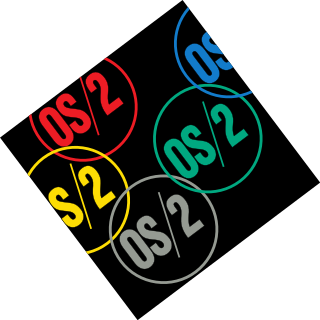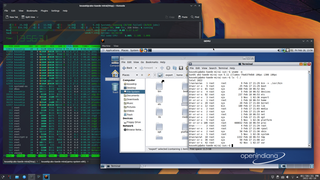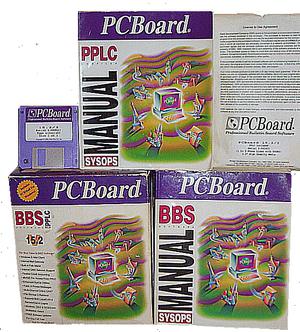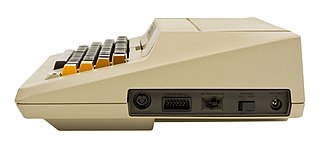Related Research Articles

A bulletin board system (BBS), also called a computer bulletin board service (CBBS), was a computer server running software that allowed users to connect to the system using a terminal program. Once logged in, the user can perform functions such as uploading and downloading software and data, reading news and bulletins, and exchanging messages with other users through public message boards and sometimes via direct chatting. In the early 1980s, message networks such as FidoNet were developed to provide services such as NetMail, which is similar to internet-based email.

In computing, a device driver is a computer program that operates or controls a particular type of device that is attached to a computer or automaton. A driver provides a software interface to hardware devices, enabling operating systems and other computer programs to access hardware functions without needing to know precise details about the hardware being used.

OS/2 is a series of computer operating systems, initially created by Microsoft and IBM under the leadership of IBM software designer Ed Iacobucci. As a result of a feud between the two companies over how to position OS/2 relative to Microsoft's new Windows 3.1 operating environment, the two companies severed the relationship in 1992 and OS/2 development fell to IBM exclusively. The name stands for "Operating System/2", because it was introduced as part of the same generation change release as IBM's "Personal System/2 (PS/2)" line of second-generation personal computers. The first version of OS/2 was initially released in December 1987, and newer versions were released until December 2001.
Telnet is a client/server application protocol that provides access to virtual terminals of remote systems on local area networks or the Internet. It is a protocol for bidirectional 8-bit communications. Its main goal was to connect terminal devices and terminal-oriented processes.

A terminal emulator, or terminal application, is a computer program that emulates a video terminal within some other display architecture. Though typically synonymous with a shell or text terminal, the term terminal covers all remote terminals, including graphical interfaces. A terminal emulator inside a graphical user interface is often called a terminal window.
FOSSIL is a standard protocol for allowing serial communication for telecommunications programs under the DOS operating system. FOSSIL is an acronym for Fido Opus SEAdog Standard Interface Layer. Fido refers to FidoNet, Opus refers to Opus-CBCS BBS, and SEAdog refers to a Fidonet compatible mailer. The standards document that defines the FOSSIL protocol is maintained by the Fidonet Technical Standards Committee.
Telegard is an early bulletin board system (BBS) software program written for IBM PC-compatible computers running MS-DOS and OS/2. Telegard was written in Pascal with routines written in C++ and assembly language, based on a copy of the WWIV source code.
PuTTY is a free and open-source terminal emulator, serial console and network file transfer application. It supports several network protocols, including SCP, SSH, Telnet, rlogin, and raw socket connection. It can also connect to a serial port. The name "PuTTY" has no official meaning.

Null modem is a communication method to directly connect two DTEs using an RS-232 serial cable. The name stems from the historical use of RS-232 cables to connect two teleprinter devices or two modems in order to communicate with one another; null modem communication refers to using a crossed-over RS-232 cable to connect the teleprinters directly to one another without the modems. It is also used to serially connect a computer to a printer, since both are DTE, and is known as a Printer Cable.
Synchronet is a multiplatform BBS software package, with current ports for Microsoft Windows, Linux, and BSD variants. Past versions also ran on MS-DOS and OS/2, but support for those platforms were dropped in version 3.0.

QEMU is a free and open-source emulator. It emulates a computer's processor through dynamic binary translation and provides a set of different hardware and device models for the machine, enabling it to run a variety of guest operating systems. It can interoperate with Kernel-based Virtual Machine (KVM) to run virtual machines at near-native speed. QEMU can also do emulation for user-level processes, allowing applications compiled for one architecture to run on another.

PCBoard (PCB) was a bulletin board system (BBS) application first introduced for DOS in 1983 by Clark Development Company. Clark Development was founded by Fred Clark. PCBoard was one of the first commercial BBS packages for DOS systems, and was considered one of the "high end" packages during the rapid expansion of BBS systems in the early 1990s. Like many BBS companies, the rise of the Internet starting around 1994 led to serious downturns in fortunes, and Clark Development went bankrupt in 1997. Most PCB sales were of two-line licenses; additional line licenses were also available.

A terminal server connects devices with a serial port to a local area network (LAN). Products marketed as terminal servers can be very simple devices that do not offer any security functionality, such as data encryption and user authentication. The primary application scenario is to enable serial devices to access network server applications, or vice versa, where security of the data on the LAN is not generally an issue. There are also many terminal servers on the market that have highly advanced security functionality to ensure that only qualified personnel can access various servers and that any data that is transmitted across the LAN, or over the Internet, is encrypted. Usually, companies that need a terminal server with these advanced functions want to remotely control, monitor, diagnose and troubleshoot equipment over a telecommunications network.

SPITFIRE is a DOS-based bulletin board system written by Mike Woltz (1945-2022), published by his company Buffalo Creek Software of West Des Moines, Iowa.
Amiga software is computer software engineered to run on the Amiga personal computer. Amiga software covers many applications, including productivity, digital art, games, commercial, freeware and hobbyist products. The market was active in the late 1980s and early 1990s but then dwindled. Most Amiga products were originally created directly for the Amiga computer, and were not ported from other platforms.
X00 was a popular DOS-based FOSSIL driver which was commonly used in the mid-1980s to the late 1990s and is even still used today. FOSSIL drivers were mainly used to run BBS software under MS-DOS. X00 can also be run under Windows, or even Linux and DOSEMU environments, to allow FOSSIL-aware MS-DOS based applications to function.

RemoteAccess is a DOS Bulletin Board System (BBS) software package written by Andrew Milner and published by his company Wantree Development in Australia. RemoteAccess was written in Turbo Pascal with some Assembly Language routines. RemoteAccess began in 1989 as a clone of QuickBBS by Adam Hudson. It was released under the shareware concept in 1990 and became popular in North America, Europe, UK, South Africa, and the South Pacific. Initially the main advantage over QuickBBS was its ability to run multiple nodes under Microsoft Windows, Quarterdeck's DESQview and OS/2. RA could also operate over a network or even a combination of network and multitasking operating systems to provide multiple "nodes per station" capabilities.
ZOC is a popular computer-based terminal emulator and Telnet software client for the Microsoft Windows and Apple Macintosh macOS operating systems that supports telnet, modem, SSH 1 and 2, ISDN, serial, TAPI, Rlogin and other means of communication. Its terminal emulator supports Xterm emulation with full colors, meta-keys and local printing, VT102, VT220 and several types of ANSI as well as Wyse, TVI, TN3270, and Sun's CDE. It supports full keyboard remapping, scripting in REXX and other languages, and support for named pipes.

The Serial Input/Output system, universally known as SIO, was a proprietary peripheral bus and related software protocol stacks used on the Atari 8-bit family to provide most input/output duties for those computers. Unlike most I/O systems of the era, such as RS-232, SIO included a lightweight protocol that allowed multiple devices to be attached to a single daisy-chained port that supported dozens of devices. It also supported plug-and-play operations. SIO's designer, Joe Decuir, credits his work on the system as the basis of USB.
The MacintoshCommunications Toolbox, generally shortened to CommToolbox or CTB, was a suite of application programming interfaces, libraries and dynamically loaded code modules for the classic Mac OS that implemented a wide variety of serial and network communication protocols, as well as file transfer protocols and terminal emulations.
References
- ↑ "THE OFFICIAL BBS FAQ: THE HISTORY OF FOSSIL DRIVERS" . Retrieved 5 December 2008.